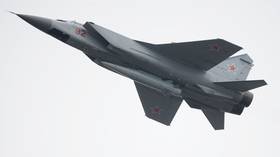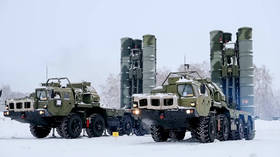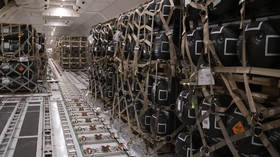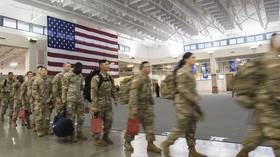Top official explains why Russia hasn't run out of precision missiles in Ukraine
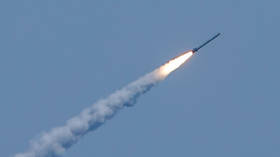
Contrary to Western expectations, Russia hasn’t run out of precision munitions during the now almost two-month-long conflict in Ukraine. RT spoke to Yury Borisov, Russian deputy prime minister in charge of defense procurement, about the state of the nation’s defense industry and the impact of Western sanctions.
RT: Mr. Borisov, the West has imposed unprecedented sanctions on Russia, measures that the Kremlin has dubbed an overt economic war. Can you tell us how state defense procurements are functioning under this pressure?
Yury Borisov: We don’t see any serious threats that could undermine our work on the planned tasks in state defense procurement. Perhaps this is a result of our Western partners keeping us on our toes since 2014. We have had plenty of time to adapt to the continuous sanctions they have been introducing against Russia. We now have import substitution policies in place, and we have accumulated a necessary reserve stock of critically important materials and components. Therefore, Russia’s current state defense procurement program is under no threat.
I would say that today’s situation in defense procurement is even better compared to the previous years. We already have contracts for 88% of our annual commitments. In previous years, we would not normally get to this figure before the end of May. And the cash execution of the state budget looks really good.
This has to do primarily with the fact that given the current situation around the sanctions against Russia’s financial institutions, which necessitated an increase in the key rate, we are trying to use the budgetary resources appropriated for the defense procurement program as much as we can.
The customers of state defense procurement and acquisition – mainly Russia’s defense Ministry, but also other government agencies – actively employ the 100% prepaid model for procurement of basic electronic components, basic materials and component parts. This provides hedging of risks related to nonperformance and helps build up a reserve stock. We are absolutely certain that by the end of this year, the mean annual share of completed contracts will reach 97-98%. This has become our standard already. However, all outstanding obligations to the key customers are usually cleared in the first quarter of the following year.
RT: Import substitution must now be among the top priorities, and more urgent than ever before, especially when it comes to the defense industry. Just an example, from my own experience, I was recently near Kiev, and the military vehicles that were taking us, the reporters, on assignments were Typhoons. They are impressive vehicles, but…
Yury Borisov: There are several variants. Which one were you using, was it a four-by-four armored vehicle?
RT: No, it was a six-by-six.
Yury Borisov: So it was a KAMAZ Typhoon vehicle, I see. (KamAZ-63968 Typhoon-K – RT).
RT: Yes, absolutely, it was a KAMAZ Typhoon vehicle, right. But, for instance, it has Michelin tires. The transmission gearbox is imported too, and lots of other parts, so that the mechanics say they don’t even know how it’s going to be now regarding spare parts. And, as far as I know, Typhoons are not the only example of a really great Russian vehicle that people are now having questions about in terms of maintenance. Do you have an answer to these questions?
Yury Borisov: Of course, I do. We had a number of meetings with major manufacturers regarding both Russia’s state defense procurement program and the automotive industry on the whole.
It surely is a very challenging situation for our automotive industry now that some key components are no longer available.
If we consider the entire range of the vehicles we produce, from trucks to buses, including passenger buses, we will see that the extent of locally manufactured content is very different. The share of foreign-made components can be very different. This industry is undergoing a considerable change today, just like Russia’s entire economy and all other industries. Changes are being introduced into the supply chains; we’re bringing in new suppliers. Of course, it means that production will slow down, obviously. We are open about this.
But transitioning to new suppliers and opening new supply channels to ensure we get the necessary parts will ensure a more sustainable production in the future.
In some cases, it will mean that manufacturers will have to downgrade a little, to use less sophisticated components, for example, to go back to a manual gearbox rather than an automatic one. In some cases, the scope of provided features will have to be reduced, but none of that will seriously affect the operational qualities and consumer experience.
KAMAZ, for one, is about to fully localize production of its K-5 flagship model. This truck will soon drive Volvo and Mercedes from the market, making KAMAZ number one on the market for transport trucks.
As for military equipment and vehicles, I recall that in May 2014, back when I served as deputy defense minister, we launched a ministry initiative, proposed at meetings in Sochi, to phase out all imports of Ukrainian- and NATO-produced components.
Back then, we made two lists of all imported components that were critical to Russia’s state defense procurement program. And we kept working, step-by-step, to phase out all such imports from Ukraine. Back in the day, there were Ukrainian components we couldn’t do without, for example, marine engines and turbines manufactured by Zorya-Mashproyekt and Ivchenko Progress. The same was true for Motor Sich-produced aircraft engines and some other components for the aviation industry. That was because Russia’s military air transportation fleet at the time consisted mostly of Soviet models, as it still does, and many were co-developed by the Ukraine-based Antonov design bureau.
By the end of 2018, we successfully phased out most of the Ukrainian imports in military technology.
I believe Russia only benefited from this. It means that we have secured all our future operations and are no longer relying on supplies from Ukraine. Ukraine, on the other hand, has lost a large market. Those several billion dollars the country could have made in recent years could have boosted the Ukrainian economy.
But what’s done is done. We’re on the same track to phase out imports from so-called ‘unfriendly countries, ‘the member states of NATO. The progress here is, however, slow, as the task is more challenging. They supply mostly electronic components, where cutting edge technologies are applied, both for civil and military purposes.
One example that has made the headlines is the Irkut MC-21 airliner. We started off by switching to the locally produced composite materials, and that’s done now. More recently, pressured by the new round of sanctions introduced in response to the operation in Ukraine, we have almost completely phased out all imports of parts such as Pratt & Whitney engines for our flagship projects. We’re really stepping up our transition efforts.
RT: Speaking of this, I have a question for you about the PD-14 engine and the SSJ-100 jet.
Yury Borisov: The PD-14 turbofan engine is already used in the Russian MC-21 airliner. Today, when foreign engine producers have cut off their supplies, this option is no longer on the table for us. You see, in the past there used to be two options – our jets either used foreign-made engines or PD-14s. So now we will have to start mass production of jets equipped with the Russian-made PD-14 engine. And we will have to find substitutes for a number of critically important avionic onboard systems. In late 2024, early 2025, we will have to move on to ramping up mass production of MC-21, which is a fully Russian-made airliner, made up of exclusively domestic components.
Russia plans to make the Superjet-100 aircraft fully independent of imported components by 2023, and starting from 2024, to launch mass production of at least 20 jets per year. This will meet the expected domestic market demand for this model in the foreseeable future. It will be a fully Russian-made aircraft, the Superjet-100-New. And in late 2024, early 2025, we will have to move on to ramping up mass production of the MC-21, which is a fully Russian-made airliner, made up of exclusively domestic components.
I am sure we will learn from this situation, draw the right conclusions that will serve us in the future. We are not on the moon, so we can’t stay clear of the global division of labor, so to speak. And we don’t mean to do this, either. Fortunately for us, the world is not limited to the US and Europe, which keep slapping us with unprecedented sanctions. Most countries, in fact, did not support these sanctions and are prepared to work with Russia. The largest BRICS economies are among them, China, India, Brazil, and a number of Arab countries continue to work with us, too. Russia is on the lookout for new suppliers right now. I believe that the Russian economy will manage to withstand the effect of these sanctions and the pressure, which is very hard for us, of course. However, this situation has its advantages that we have seen put into practice already. In particular, if it were not for the sanctions introduced back in 2014, Russia’s agriculture sector would not be where it is now. And as it is, we are able to cover the domestic need for all basic agriculture products on our own. And not only that, Russia’s cereal imports have increased in recent years. We don’t only provide for ourselves, we are practically feeding the world today.
The main bonus that comes with import substitution is that new niches are created in the economy. It’s a challenge and an opportunity for Russian industry, for Russian design and engineering, for research and development centers to use their own modern technology and products in order to fill these niches and not give them up. I can say that such niches have opened in almost every systemically important sector of Russia’s economy.
It’s a serious challenge. But, on the other hand, it’s an excellent opportunity for companies to massively increase their presence on the domestic market and lay solid groundwork for entering global markers in the future.
RT: Speaking about aircraft engineering, what is the current status of the IL-496 project?
Yury Borisov: The IL-496 aircraft, or IL-96-400, is due to be completed this year. So far, as you know, we’ve had the IL-96-300 produced in a small series and used for a number of purposes, mostly for the special flight squadron, which carries the president and the prime minister, and conducts special military flights.
A limited serial production could be launched if needed, two to four aircraft per year, to ensure long-range flights. This hasn’t been necessary so far. But I think this model is a very good one, praised by all the pilots. It has had virtually no accidents throughout its lifetime. So, there will be demand.
RT: Let’s talk more about Russia’s military capabilities. US intelligence was quick to report that Russia was out of its entire stock of Kalibr missiles within the first week or so of the special operation. And yet, they are still operational, successfully delivering precision strikes on enemy targets. I fully understand that most of the information regarding our weapons is top secret, however. What I would like to ask is whether our defense industry is up to the task of re-supplying all the weapons our troops have used up already, like the Kalibr, Iskander and Kinzhal missiles. How is it doing in this regard?
Yury Borisov: First of all, these missiles that you mentioned, as well as some others including Kh-101 air-launched cruise missiles, and Bastion and Bal coastal defense missile systems, as well as the above mentioned sea-launched cruise missiles, the Kalibr, Iskander and Kinzhal, all fall into the category of high-precision weapons. Modern warfare favors the use of high-precision weapons, starting from the Yugoslav wars in the late 20th century.
High-precision weapons are to a certain extent more humane, if that can be said about any weapon at all; and that’s because they can be used to eliminate military targets, such as parked vehicles, arms depots, command posts, infrastructure targets, and so on. High precision munitions have the error probability of just a few meters. They can travel hundreds of kilometers and have next to zero CEP.
As a result, they are much more efficient than the weapons of the past that are becoming obsolete. They cause too much destruction and too many civilian deaths, which is unacceptable in such conflicts.
During this operation, Russian troops are making sure to avoid civilian casualties. That’s their priority. Our fight is not with the civilian population. Our fight is to ensure a future for the Russian-speaking civilian population.
I would like to say that high-precision weapons, used by the Russian forces, ensure that we achieve our military goals with the desired level of efficiency.
Now, back to your question. From as early as 2011, all our defense procurement programs have focused on the production and deployment of high-precision weapons. All this time, we have also been building up our manufacturing capacities. As a result, today, we can fully meet the demand of Russia’s armed forces for precision weapons.
Since you mentioned the seaborne Kalibr cruise missile, the fact is that almost all Russian ships and Project 636.6 diesel submarines carry Kalibr missiles. Deployed in the Black Sea, they can strike military targets anywhere in Ukraine. The same is true for other types of missiles, including the air-launched missiles carried by the Sukhoi Su-30 and Su-35 fighter-bombers. We have a wide range of air-to-surface munitions with a different effective range and power to hit different types of targets. Because of that, Russia dominates the sky in Ukraine. Russia’s Air Force ensures this with its efficient air-launched weapons.
Russia’s major defense manufacturers have contracts for high-precision weapon production until 2030 or, in some cases, 2033. Those enterprises are doing well. They can plan for the long term and adjust their capacities accordingly. They also keep developing upgrades for these weapon systems. It’s a well-built, sustainable operation, with great future potential. That’s what’s going on in Russia in terms of modern weapons production.
RT: How would you assess the performance of these new, state of the art, high-precision weapons on the battlefield? Not in military exercises, but in actual conflict.
Yury Borisov: As you know, we’ve acquired a lot of experience during the Syrian conflict, where we’ve already put our key weapons to the test.
RT: In the Syrian Arab Republic…
Yury Borisov: Yes. We piloted the key weapons systems in that conflict. And I don’t mind saying that we made corrections as we went on, adjusting the specifications based on our experience. It is the result of cooperation between our military and the defense industry.
Representatives of the military-industrial complex were present on the ground in Syria, supporting all the combat operations, collecting statistics on the performance of various kinds of weapons against their specifications. So this close cooperation yielded very good results, which has already been apparent during the special military operation in Ukraine.
RT: Tell us about the current state of commercial and military shipbuilding in Russia, please. What measures have the government put in place to mitigate the effect of sanctions and support commercial and military shipbuilding?
Yury Borisov: As for military shipbuilding, Russia has very solid positions as far as its strategic nuclear-powered submarine fleet is concerned. I mean strategic Borei and Borei-A class submarines and also Yasen class multi-purpose nuclear-powered submarines. We have enough of those. Our needs are fully met in this respect, both in terms of quantity and quality. The composition of our strategic nuclear forces is very advanced, state of the art.
In the past, there was a pronounced lack of open ocean vessels in Russia, which mainly focused on small corvette class warships and guided missile ships. As a result, these types of vessels are very modern and upgraded. Over the past three to four years, we have employed a system of loans to finance open ocean vessels, primarily frigates and corvettes.
As for aircraft carriers, such questions are often discussed at defense meetings in Sochi. In general, the development of high-precision and hypersonic weapons sometimes renders aircraft carrier groups useless, overshadowing their potential.
And besides, the US may need a powerful aircraft carrier group, since they are far away and need to cross the ocean before they reach any theater of operation on this continent. Russia, on the contrary, has always pursued a defense strategy, so the need for these types of vessels is debatable. But I think that you can’t just stop using this type of naval equipment altogether, you must think about it all the time. But this costs a lot of money.
At the same time, it’s possible to achieve the goals set for the Russian Navy in a more economical way – by opting for cheaper models, if we are talking of open ocean vessels, for example, and achieve a similar effect. So, it’s up to the military to determine what they really need. Even when I worked at the defense ministry, I never deemed it possible for myself to teach military professionals which types of weapons are best for them. They will decide on their own.
RT: Besides, an aircraft carrier is an easy target…
Yury Borisov: It’s a target, yes. But, of course, it’s protected. It is equipped with anti-aircraft and missile defense systems. Now, let’s talk about commercial ships.
Since Soviet times, all our ships had been manufactured in countries like Finland, or in former COMECON countries, such as Poland. Only recently have we started developing our own key shipbuilding assets, such as the United Shipbuilding Corporation.
In the Far East, we have the Zvezda Shipbuilding Complex, which specializes in large-capacity vessels, because those are used for the Northern Sea Route and because that region is a source of hydrocarbons.
Hydrocarbons are mostly transported by sea, using various kinds of ships, such as Aframax vessels, bulk carriers, coal carriers and tankers for liquid hydrocarbons.
This is evidently a new territory for Russian shipbuilders. And, of course, we have established and are developing partnerships with leading shipbuilding countries, starting with South Korea, which is a well-recognized leader in the construction of large-capacity ships. China, which is also a potential partner of ours, is now approaching their level of expertise.
So, we’ll continue manufacturing all these types of ships in the Far East, at the Zvezda shipyard. But we admit that we’ll have to restructure the whole supply chain here as well and look for new partners because two major ship engine makers, MAN and Wartsila, have refused to work with us. We’ll have to find other solutions, including by leveraging our own resources. Sinara and Transmashholding have made some advances in diesel shipbuilding. So we will develop our own expertise, maybe work together with a new R&D alliance.
We will also need fishing and crabbing vessels. It’s a matter of food security. All the recent policies, such as handing out fishing quotas to companies that invest in fleets, have been helpful and spurred demand for such vessels.
UPDATE: This article has been amended in regards to a quote by Yury Borisov on the missiles carried by the Sukhoi Su-30 and Su-35 fighter-bombers.
